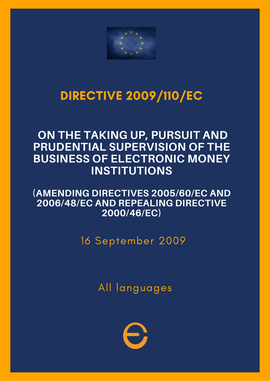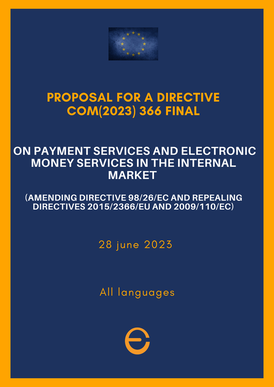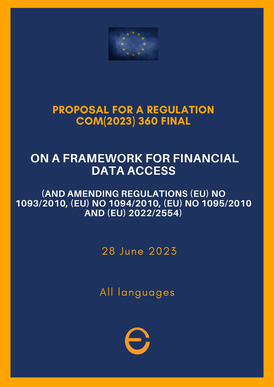|
Brussels, |
|
eMoney
For helping consumers.
The European Union (EU) is taking measures to regulate electronic money (e-money), which serves as a digital substitute for physical cash. The objectives of EU rules on e-money are:
1. Promoting Innovation: EU rules aim to support the development of innovative and secure e-money services, enabling users to make cashless transactions using funds stored on cards, mobile phones, or online platforms.
2. Market Access: These regulations aim to grant new companies entry into the e-money market, fostering a diverse range of providers.
3. Competitive Environment: EU rules are designed to stimulate healthy competition among all participants in the e-money market, ensuring that consumers have access to a variety of e-money services and options.
1. Promoting Innovation: EU rules aim to support the development of innovative and secure e-money services, enabling users to make cashless transactions using funds stored on cards, mobile phones, or online platforms.
2. Market Access: These regulations aim to grant new companies entry into the e-money market, fostering a diverse range of providers.
3. Competitive Environment: EU rules are designed to stimulate healthy competition among all participants in the e-money market, ensuring that consumers have access to a variety of e-money services and options.
Definitions and basic information
EU legislation on electronic money (e-money) primarily revolves around the Electronic Money Directive:
- Definition of E-money: The directive provides a legal definition of electronic money, describing it as electronically stored monetary value, issued on receipt of funds for the purpose of making payment transactions, which can be accepted by entities other than the issuer.
- E-money Institutions: It sets out rules for the operation of electronic money institutions, which are companies or organizations authorized to issue electronic money. These institutions must meet certain capital requirements and comply with various prudential and operational regulations.
- Consumer Protection: The directive includes provisions to safeguard the interests of electronic money users. It requires institutions to provide transparent information to users, ensure the security of e-money, and offer protection in case of insolvency.
- Supervision: The directive establishes a framework for the supervision of electronic money institutions by national competent authorities in EU member states. It also outlines procedures for cross-border activities of e-money institutions.
- Redemption and Withdrawal: It details the rights of e-money holders to redeem their electronic money at any time and specifies conditions for withdrawal, ensuring that users have access to their funds.
- Security Requirements: The directive mandates security measures to protect electronic money against fraud and misuse, including the use of secure technical protocols and encryption.
- Cross-Border Services: It promotes the provision of cross-border e-money services within the EU by harmonizing the regulatory framework and ensuring that institutions can operate across member states.
- E-money and Payment Services: The directive interacts with other EU legislation, such as the Payment Services Directive (PSD2), to ensure coherence between regulations governing different aspects of the financial services industry.
eMoney Directive
 Click to read
Click to read
The Electronic Money Directive (EMD) is an EU regulation that governs the operation and oversight of electronic money (e-money) institutions. Its primary objectives are to foster the development of secure and innovative e-money services, provide access to the e-money market for new companies, and promote healthy competition among all market participants. Key points of the directive include:
- Market Development: The EMD aims to contribute to the creation of a unified single market for e-money services within the European Union (EU). This market integration benefits consumers, businesses, and the broader EU economy.
- Alignment with PSD: The EMD aligns its provisions with the EU's Payment Services Directive (PSD) to promote a single EU payments market. This alignment ensures consistency in payment services regulations for the benefit of all stakeholders.
- Objectives:
- Facilitate Innovative and Secure E-money Services: The directive encourages the emergence of new, secure, and innovative e-money services.
- Market Access: It allows new companies to enter the e-money market, increasing competition and choice for consumers.
- Competition: The directive fosters competition among all market participants, promoting efficiency and innovation.
- Prudential Requirements: The EMD modernizes EU regulations on e-money, aligning the prudential regime for e-money institutions with the requirements for payment institutions in the PSD. This includes proportionate prudential requirements to facilitate market entry for newcomers, such as reducing the initial capital requirement to €350,000 and introducing new rules for calculating own funds.
- Covered Institutions: Entities covered by the EMD include banks, e-money institutions, the European Central Bank, and national central banks.
- Permitted Activities: E-money institutions are permitted to engage in various activities, including providing payment services and extending credit related to these payments.
- PSD2: The directive mentions the adoption of PSD2, a new directive on payment services in October 2015, which improved security, expanded consumer choice, and kept pace with payment innovation. PSD2 repealed Directive 2007/64/EC and became effective from January 13, 2018.
Ongoing revisions of the EU legislation
 Click to read
Click to read
On 28 June 2023, the European Commission introduced proposals aimed at modernizing the payment and broader financial sectors to embrace the digital age. The new proposed rules are designed to enhance consumer protection and competition in electronic payments, giving consumers the ability to securely share their data, thereby enabling access to a wider range of cost-effective financial products and services.
The key aspects of these proposals prioritize consumer interests, competition, security, and trust.The payment services landscape has undergone significant changes in recent years, with electronic payments in the EU experiencing substantial growth, reaching €240 trillion in value in 2021. This trend was accelerated by the COVID-19 pandemic, and it has seen the emergence of new providers, particularly those offering 'open banking' services that securely share financial data between banks and fintech firms. Simultaneously, new forms of sophisticated fraud have arisen, posing risks to consumers and eroding trust.
In response to these developments, the Commission is introducing a package of measures to ensure the EU's financial sector is adaptable to the ongoing digital transformation, considering both the associated risks and opportunities, particularly for consumers.
The key aspects of these proposals prioritize consumer interests, competition, security, and trust.The payment services landscape has undergone significant changes in recent years, with electronic payments in the EU experiencing substantial growth, reaching €240 trillion in value in 2021. This trend was accelerated by the COVID-19 pandemic, and it has seen the emergence of new providers, particularly those offering 'open banking' services that securely share financial data between banks and fintech firms. Simultaneously, new forms of sophisticated fraud have arisen, posing risks to consumers and eroding trust.
In response to these developments, the Commission is introducing a package of measures to ensure the EU's financial sector is adaptable to the ongoing digital transformation, considering both the associated risks and opportunities, particularly for consumers.
 Click to read
Click to read
This package includes:
- Amendment and Modernization: The Commission proposes to amend and modernize the current Payment Services Directive (PSD2), resulting in PSD3, and establish a Payment Services Regulation (PSR). These measures aim to ensure secure electronic payments and transactions within the EU, whether domestic or cross-border, in both euro and non-euro currencies. This modernization seeks to safeguard consumer rights and enhance the availability of payment service providers.
- Financial Data Access Framework: Additionally, the Commission is introducing a legislative proposal for a framework governing financial data access. This framework will define clear rights and responsibilities related to customer data sharing in the financial sector, extending beyond payment accounts. This is expected to foster innovation in financial products and services, promoting competition within the financial sector, and benefiting users.
Source: European Union, http://www.europa.eu/, 1998-2024
|
Brussels - Milano - Nice - Tokyo
|
eEuropa Belgium
Avenue Louise, 367 1050 Brussels BELGIUM Bld. Franck Pilatte, 19 bis
06300 Nice FRANCE YONO HOUSE 9-1 KAMIOCHIAI, SAITAMA-SHI, SAITAMA-KEN 〒 338-0001 JAPAN Via S. Veniero 6 20148 Milano ITALY |
All rights reserved - © Copyright eEuropa Belgium 2020-2024

